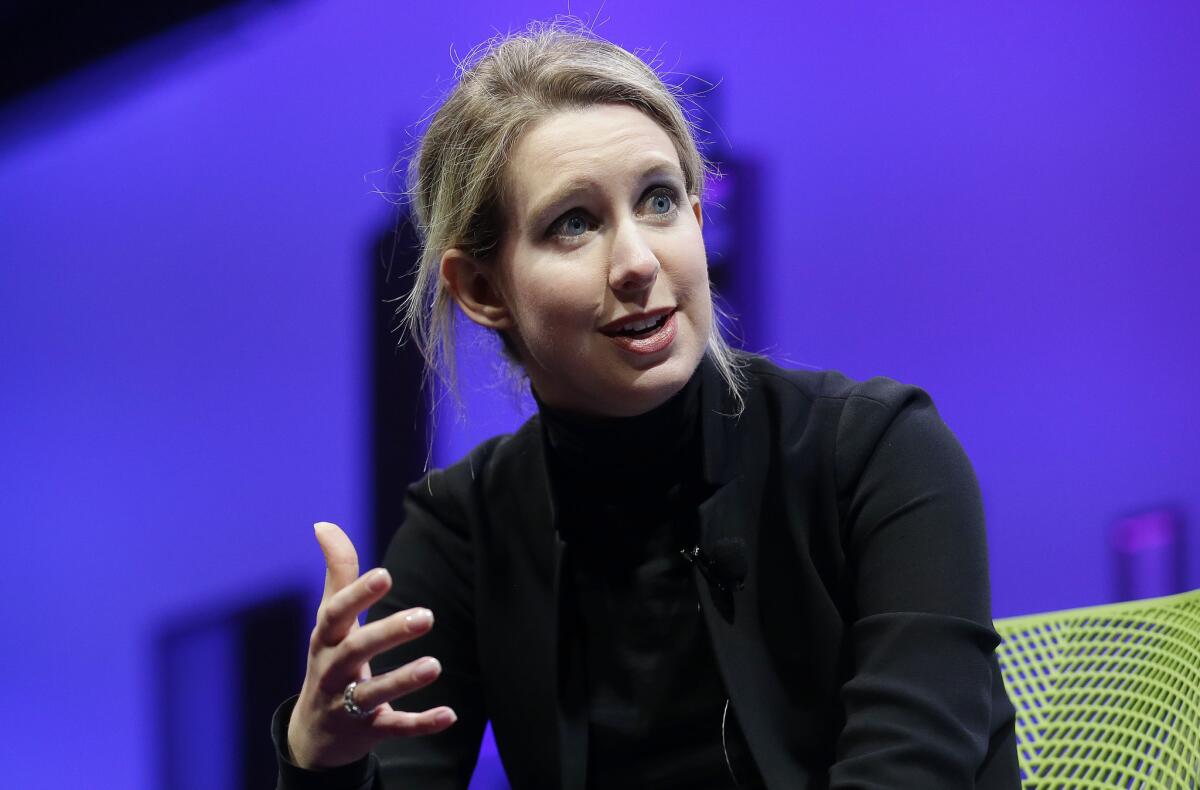Theranos seeks turnaround with a portable blood-testing device, but skepticism abounds

- Share via
By Thursday, Theranos had scrubbed its website of its list of blood-testing “wellness centers” and the glowing reviews by patients praising its minimally invasive method.
Also gone is nearly all mention of “Edison” -- the technology that the start-up’s 32-year-old founder, Elizabeth Holmes, had promised would revolutionize blood-testing around the world.
The revised website -- and the company’s announcement Wednesday that is was shutting its labs and blood-testing centers -- is part of Holmes’ strategy to remake her devastated start-up, which only two years ago had been valued at $9 billion.
Rather than selling low-priced lab tests to consumers, Theranos is now focusing its “undivided attention” on developing a portable blood-testing device it calls the miniLab, Holmes wrote in a letter.
In the process, 340 employees, or 43% of Theranos’ workforce, will lose their jobs.
It’s a stark retreat for Holmes, who Forbes last year hailed as the youngest self-made female billionaire.
And Holmes’ new business plan does not appear to be nearly as lucrative. Before, Holmes had been aiming to be a blood-testing giant like LabCorp or Quest Diagnostics. Now if Holmes’ current plans succeed, Theranos would be just another Silicon Valley company selling medical hardware.
“Will this be a blockbuster moneymaker?” said Stephen Master, an associate professor of pathology and laboratory medicine at Weill Cornell Medical College. “No, it sounds like it’s on a fundamentally smaller scale.”
And it’s far from clear whether her new technology will work better than Edison.
“There is a lot of skepticism,” said Patricia Jones, president of the American Assn. of Clinical Chemistry. “The verdict is still out.”
On Aug. 1, Holmes unveiled the miniLab at the association’s annual meeting in Philadelphia.
The microwave-sized black box includes a robot inside that performs a variety of tests using a small sample of blood. The boxes would serve as remote medical testing stations, perhaps set up in doctor’s offices, and be controlled from a central lab.
Holmes had little choice but to leave the business of operating blood testing labs. In July, after finding a number of violations at the company’s Northern California lab in Newark, federal regulators banned Holmes from owning or running a medical lab for two years.
The ban had followed news in May that Theranos was retracting the results of tens of thousands of blood tests that doctors had depended on to care for patients over the last two years.
And Walgreens said in June that it was ending its lucrative deal with Theranos to add blood testing sites to its chain of drugstores -- a plan that had begun with 40 stores in Arizona.
Theranos now faces lawsuits brought by patients and a number of investigations.
Scrutiny of the accuracy of Holmes’ Edison device -- which she said could perform multiple tests with just a few drops of blood -- had begun a year ago when the Wall Street Journal raised questions in a series of stories.
This time, Holmes is promising to do what she didn’t do before: gain approval for her device from the Food and Drug Administration and publish scientific data to show it works.
“We have a new executive team leading our work toward obtaining FDA clearances, building commercial partnerships, and pursuing publications in scientific journals,” Holmes wrote in Wednesday’s letter.
“We are fortunate to have supporters and investors who believe deeply in our mission of affordable, less invasive lab testing, and to have the runway to realize our vision,” she added.
She has work to do before others are on board.
“Does it appear to have some nice engineering in it? Yes,” said Master of the miniLab. “But there are key pieces we haven’t yet seen.”
Warned Jones: “She has to absolutely understand the regulatory environment. When it comes to patient safety you can’t be too careful.”
Follow @melodypetersen on Twitter
MORE BUSINESS NEWS
LinkedIn wants to help you look for a job behind your boss’s back. But be careful
Snapchat said to be eyeing $25-billion IPO in early 2017
FCC proposal would let Internet providers share your ‘non-sensitive’ data without your permission
More to Read
Inside the business of entertainment
The Wide Shot brings you news, analysis and insights on everything from streaming wars to production — and what it all means for the future.
You may occasionally receive promotional content from the Los Angeles Times.











